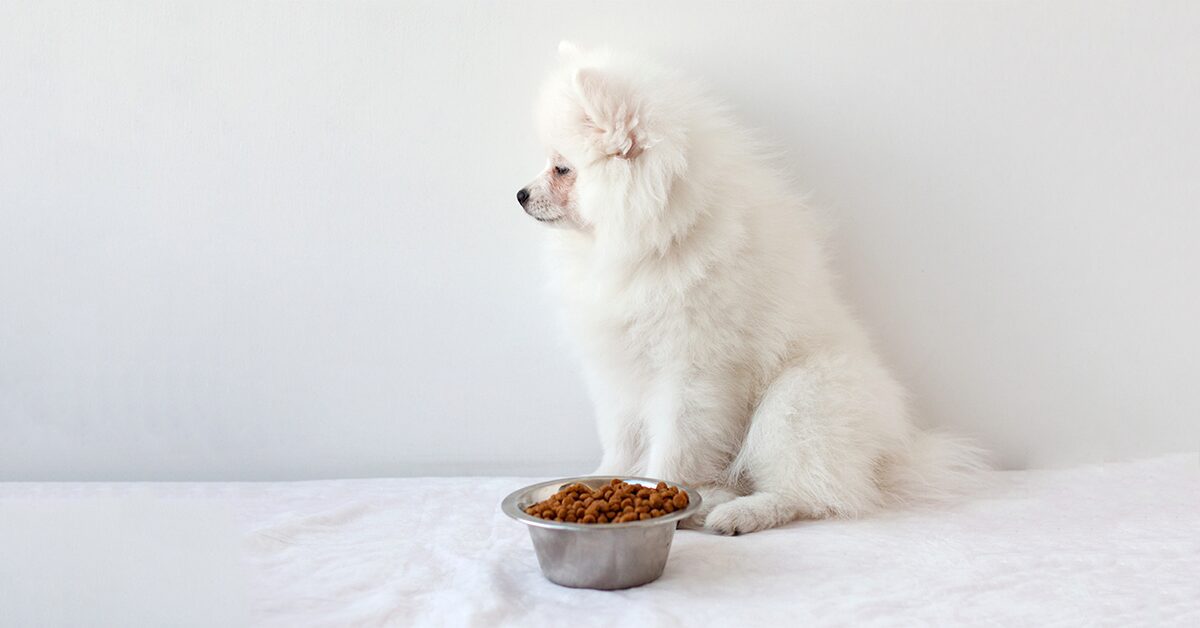Is your new puppy avoiding their food bowl? If your new canine companion has refused meal after meal, it could be time for a trip to the vet.
New puppies cannot go longer than 12 hours without eating, as it can cause a serious dip in their blood sugar. Puppies also do not have fat reserves, so they’re more likely than adult dogs to experience starvation as well as dehydration.
Here are some of the more common reasons for your puppy’s loss of appetite.
Picky eater
We all know a picky eater when we see one, but puppies usually have the opposite problem – they want to eat everything! On occasion, a puppy will have more specific eating preferences. If your veterinarian determines that there isn’t an underlying issue for your puppy’s decreased appetite, consider some other questions. Does your pooch love their training treats? Do they try to eat human food? If your furry friend has an appetite for food outside of their regular dog food, you may have found the rare picky puppy.
Upset stomach
If your puppy has been eating everything, and now they suddenly have a lack of appetite, they may have eaten something that they shouldn’t. Snacks and treats, whether made for dogs or not, can cause upset stomach and digestive issues. This goes for scavenged treats, too. Make sure to puppy-proof your home and block your fur baby from human food or other pet food to the best of your ability – whether that’s your cat’s food or an adult dog’s food. The type of food that your dog eats is important, and they should be on a strictly puppy food diet until they’re old enough for adult dog food.
Seek veterinary attention if your dog has diarrhea for more than 12 hours, there is blood in their diarrhea or vomit, their gums are gray, or they become lethargic. They may be experiencing extreme dehydration, an allergic reaction to food, or another serious health issue.
Anxiety and discomfort
Your puppy has a new home and they may still be adjusting to being in a new environment. They may be experiencing separation anxiety from their mother and littermates, or may be nervous around other pets or people in the house. They might also be physically uncomfortable. Is it hot outside? Much like people, when puppies get too hot, they can lose their appetite. Make sure your puppy stays cool, inside and outside of the house.
Teething
Your healthy puppy may also be experiencing some normal pain and discomfort associated with teething. They may have even injured their mouth from chewing on something. In this case, it may be more uncomfortable for them to eat dry kibble. Check for broken teeth, splinters, and other sources of pain. Then check with a veterinarian, too! Your puppy may need to eat wet food while their mouth heals.
Talk to your vet
Before trying anything else, talk to your veterinarian about your dog not eating. Sometimes puppies need check ups more than adult dogs, and it helps to find out what’s going on with your furry friend. Did they have recent vaccinations that they could be having a reaction to? Are they experiencing seasonal allergies? Do they need to be checked for heartworms? These are all factors that your veterinarian can consider. Your vet may also prescribe a diet of veterinary recommended canned food or otherwise, to treat your puppy’s unique condition.
Solutions
Once your vet has given you the green light, you can consider other solutions. If you think that you may have a picky eater, the solution is simple! Change their regular food. Try a new food with a different texture. If that doesn’t work, try another one. Be sure to change your puppy’s food gradually, so that their stomach can adapt. Also make sure that it has the same protein ingredients as their regular food, even if it’s canned food. Introducing new proteins can upset your dog’s stomach or lead them to developing new allergies.
You can also make their food more enticing with a treat topper or by mixing in wet food. One good food topper is peanut butter, as long as it doesn’t contain xylitol. Another good one is warmed chicken. Wetting their regular food with warm water or chicken broth can also help your puppy’s appetite.
Changing the way you feed your puppy
It also helps to develop a reliable puppy feeding schedule, such as taking your puppy’s food away after 15 minutes if they’re not eating. This helps them to develop good eating habits. Ask your veterinarian about whether it’s okay to try this if you are worried that your puppy is not getting enough calories.
You can also try changing your puppy’s eating routine in an effort to help them develop good eating habits. Use interactive puzzle feeders to make mealtime fun. Use a different type of bowl or even a plate. Try feeding your puppy in a different part of the house. They may be distracted or uncomfortable in the area that you’re feeding them.Offering puppy-safe teething toys can also help your pup.
If your puppy is still not eating, hand feeding might also help. Start feeding your pup from your hand and then hold the food bowl for them, until they’re ready to eat from the bowl on their own. Be careful with this method, though, in addition to using treats as rewards. A puppy that expects treats and extra attention at mealtime will learn to ask for that, every time.
When it’s an emergency
When a puppy is so young and not getting the nutrition they need, it’s an emergency. Don’t hesitate to call your veterinarian if your puppy isn’t eating, especially if they have decreased energy, vomiting, or diarrhea. It’s a good idea to consider pet insurance before an emergency strikes, so you can get your pup the best possible care when they need it instead of worrying about the cost.
If you know that your puppy has gotten into something that they shouldn’t, if they were just vaccinated, or if they have been spending time with a lot of new dogs, pay extra close attention to their behavior and health indicators (yes, that includes puppy poops). When in doubt, contact the vet for expert advice!




